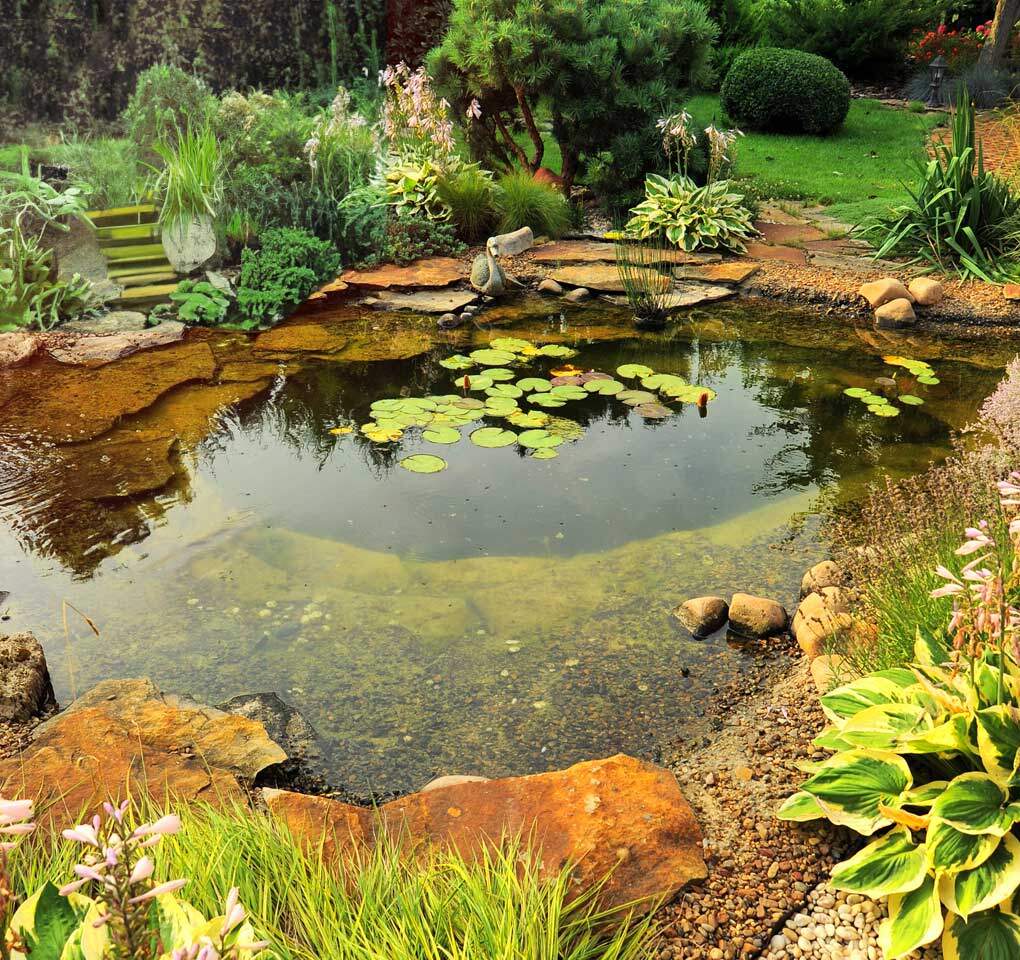Pond Filtration Systems: The Basics
Water quality is one of the most essential factors to maintaining a healthy pond. This is especially true if you have it stocked with fish and aquatic plants. In order to keep your water quality in good condition a good pond filtration system is a necessity.
The Importance of Pond Filtration: And Why It’s Important for a Healthy Pond
As a pond owner, whether you have a small backyard oasis or a large decorative water feature, one of the most critical aspects of pond maintenance is filtration. The importance of pond filtration cannot be overstated, as it plays a central role in maintaining the clarity, health, and balance of your pond’s ecosystem. Proper filtration not only keeps the water clean and free of debris but also ensures that your pond supports healthy fish, vibrant plants, and beneficial microorganisms. In this post, we’ll explore why filtration is so vital for your pond, how it works, and the benefits it provides for both the appearance and the health of your pond.
What Is Pond Filtration and How Does It Work?
Pond filtration is the process of removing impurities, debris, organic waste, and harmful substances from the water, ensuring that the pond remains healthy and clean. A good filtration system works in three key ways: mechanical, biological, and chemical filtration. Each of these types of pond filtration contributes to a well-maintained pond in a unique and complementary way.
- Mechanical Filtration: This type of filtration physically traps and removes large particles such as leaves, twigs, and other debris from the water. Mechanical filters use filter pads or sponges to capture debris as water flows through the system. Regular cleaning and maintenance of mechanical filters are essential to avoid clogging and to ensure efficient filtration.
- Biological Filtration: This is the process by which beneficial bacteria break down harmful organic matter, including fish waste, uneaten food, and decaying plants. Biological filtration helps to reduce the levels of toxic ammonia and nitrites in the water, which can be harmful to fish. The beneficial bacteria convert these compounds into less toxic substances, ensuring a balanced and healthy environment for all pond inhabitants.
- Chemical Filtration: Chemical filters use materials like activated carbon to remove dissolved pollutants, chemicals, and toxins from the water. While not always necessary, chemical filtration can be useful for treating specific issues, such as removing excess nutrients or clearing up cloudy water caused by pollutants or algae.
Disadvantages of Chemical Filtration
Chemical pond filtration can be harmful because it often involves the use of harsh chemicals, such as algaecides or clarifiers, which can disrupt the natural balance of the pond ecosystem. These chemicals can harm beneficial bacteria, fish, and plants, potentially leading to long-term water quality issues. While they may offer a quick fix for pond water problems, over time, excessive chemical use can degrade water quality, harm aquatic life, and disrupt the natural processes that keep a pond healthy.
Why Pond Filtration Is So Important for Your Pond’s Health
Maintaining the health of your pond requires more than just keeping it visually appealing. The quality of your pond’s water directly affects the well-being of fish, plants, and the overall ecosystem. The importance of pond filtration extends beyond aesthetics and plays a vital role in creating a sustainable environment.
- Cleaner, Clearer Water: One of the most immediate benefits of pond filtration is its ability to keep the water clear. Organic debris like fallen leaves, algae, and plant matter can cloud the water, making it unsightly and preventing sunlight from penetrating the surface. Filtration systems help remove this debris, ensuring that the water remains sparkling clean. Not only does this improve the visual appeal of your pond, but it also ensures that plants receive the light they need for photosynthesis.
- Algae Management and Prevention: Algae are one of the most common problems pond owners face, especially during the warmer months. When nutrients like nitrogen and phosphorus become too concentrated in the water, algae can grow rapidly, turning your pond water green and murky. The importance of pond filtration in controlling the growth of algae is significant. Filtration helps remove excess nutrients by breaking down organic waste, reducing the likelihood of algae blooms. Biological filtration also helps by supporting the growth of beneficial bacteria that naturally compete with algae for resources, helping to maintain a balanced nutrient cycle.
- Preventing Toxic Build-Up: Fish, plants, and decaying organic matter all contribute to the production of ammonia, nitrites, and nitrates in the pond. While these substances are a natural byproduct of the pond’s ecosystem, high concentrations can be toxic to fish and other aquatic life. Pond filtration plays a crucial role in keeping your pond water safe for fish and promoting a thriving aquatic environment.
- Improving Fish Health: Fish are sensitive to water quality, and poor filtration can lead to a buildup of toxins, resulting in stress, disease, or even death. Ammonia and nitrites, in particular, are harmful to fish if they reach unsafe levels. A good filtration system helps to keep these levels in check, ensuring that your fish remain healthy and stress-free. In addition, by removing organic waste and excess nutrients, filtration supports a clean and oxygenated environment that is ideal for fish to thrive.
- Supporting Aquatic Plants: Healthy aquatic plants are important for maintaining a balanced pond ecosystem. They help oxygenate the water, provide shelter for fish and wildlife, and contribute to the overall beauty of the pond. However, plants require stable water conditions to thrive. Poor filtration can lead to an overabundance of nutrients, which can cause undesirable plant growth or invasive species that crowd out beneficial plants. Proper filtration helps to maintain a balanced nutrient level, ensuring that plants have the optimal conditions they need to grow and flourish.
- Odor Control: A stagnant pond with poor filtration is more likely to develop unpleasant odors. This is typically due to the accumulation of organic matter such as dead leaves, decaying plants, and fish waste. Over time, these materials decompose and release gases like hydrogen sulfide, which produce foul smells. Pond filtration, particularly biological filtration, helps to break down organic material more efficiently, reducing the potential for odor and keeping your pond smelling fresh.
Choosing the Right Filtration System for Your Pond
Selecting the right filtration system is essential to maintaining the health and appearance of your pond. Several factors influence the choice of filter, including the size of your pond, the number of fish, the types of plants, and the specific needs of your pond ecosystem.
- Pond Size and Volume: The larger your pond, the more powerful the filtration system needs to be. It is important to choose a filtration system rated for the size of your pond to ensure it can effectively handle the water volume and maintain water quality. You can typically find filtration system recommendations based on pond size, and it’s always a good idea to select a system that can handle a bit more than your pond’s volume to ensure optimal performance.
- Fish and Plant Load: The more fish and plants in your pond, the more waste will be produced. If you have a pond with a large fish population or abundant plant growth, a higher capacity filtration system will be required. Overcrowding can overwhelm a smaller filtration system, leading to poor water quality and potential health issues for both plants and fish.
- Water Features and Circulation: Features like waterfalls, fountains, and streams help improve water circulation and promote oxygen exchange in the pond. If your pond includes water features, choose a filtration system that works well with the water flow, as proper circulation is essential for maintaining the system’s effectiveness.
Ongoing Pond Filtration Maintenance
To ensure the longevity and efficiency of your pond filtration system, regular maintenance is required. This includes cleaning filter pads, checking for blockages, and replacing filtration media as needed. Biological filters need to be cleaned gently to avoid disturbing the beneficial bacteria colonies, and mechanical filters should be rinsed periodically to prevent clogging. It’s also important to check the water quality regularly to ensure that the filtration system is working as it should.
Seeking Professional Advice
Whether you have a small decorative pond or a larger, fish-filled water feature, investing in the right filtration system will ensure that your pond remains a vibrant, thriving ecosystem for years to come.
If you are unsure about the best filtration system for your pond or need assistance with installation and maintenance, consider consulting with a local pond service professional. With their expertise, you can ensure that your pond filtration system is properly designed and maintained to keep your water clean, clear, and healthy.
A biological pond filtration system like the Country Pond filter reduces nutrients in your pond. It is these nutrients that can have a real impact on your water quality. They can enter your pond from sources like fertilizer runoff and organic debris on the bottom of your pond. A standard size filter is good for half-acre and may work for larger ponds with cyclic nutrients loads. Installation isn’t difficult and no machine excavation is required.






